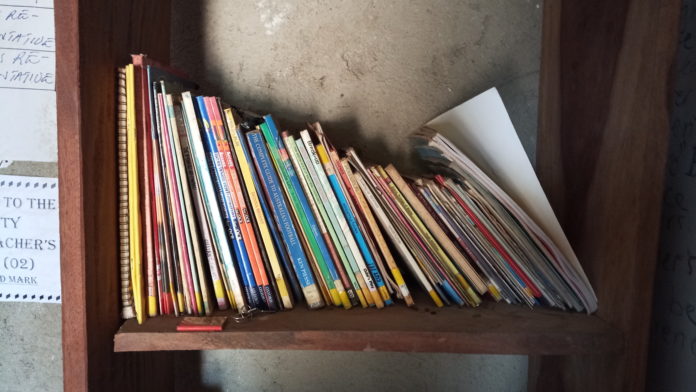By Sebit Patrick
Teachers and civil servants are urging the government to promptly pay salaries and provide learning materials to make free education effective.
Their call follows growing public frustration over poor implementation of President Salva Kiir’s 2023 directive for free primary and secondary education. Despite the policy, many public schools still charge fees, which teachers say help cover salaries and basic services.
George Kenyi Wilson, Head Teacher of Juba Day Secondary School, noted a lack of books and called for a new strategy to support education, saying it is key to lasting peace.
“Free education is supposed to come with its benefits.” George said, “One of the benefits is all the teaching materials, they’re supposed to be sponsored. Now with the new curriculum, which is a child-centered type of curriculum, each child is supposed to have a book or let us say two to share so that in the class, people are grouped into groups.”
“Government should come out with a new strategy. Sponsor education 100%. We don’t want this thing that out of the national budget only 5% go to education. How will the country come out of all this hardship? Even this issue of peace and security. Education is the biggest commodity. You give it more, peace come automatically. So sponsor education, the youth will all be busy.” George urged.
Clementina Kiden, the head teacher of Juba One Girls challenge that since the pronouncement of the free education, the government contributed nothing apart from the school structure.
“What do the government give or make or send to the school? It’s only the building. Maybe sometimes it’s the books, and the books are not even enough.” she challenged.
She said text books for learning were only provided for lower classes, hindering teaching in the upper classes of primary 7 and 8.
“The government is supposed to bring the books to the school, all the books from P1 up to P8, and now the books which we have that the government is bringing to us, it’s only for the lower classes, from P1 up to P6. P7, I have got only one book. P8, the same thing.” Kiden said
“How can the teaching become child centered when the books are not there? If the government is saying that nothing is to be given. Where shall we get the preparation book and the scheme of work? If the teachers are not even getting their salary, how can they buy everything?” The head teacher questioned.
She also laments that not paying teachers salary has made it very hard for the teachers to concentrate as their minds are filled with worries of how to make ends meet for their families.
“So, if the government is not giving that, so nothing will go ahead. So, the parents sat down. and said, we are going to contribute something so that you have to motivate them by giving something for their transport.” she asserts.
Kiden called on the government to supply stationaries, and pay teachers’ salaries promptly to reduced redundance.
“So if the government can do all these things, giving something like bringing the stationeries and also giving some services, some money for the services to run the school to be smooth, so it will be okay. So, we are crying to the government, at least let them give the payment to the teachers.” she said
Jackline Nasiwa a human right defender and civil society activist who also happened to be the executive director for Center for Inclusive Governance Peace and Justice said accessibility of the service, availability of competent teachers and the availability of resources defines free education.
“My general view about free education is that education should also be accessible. In the rural areas, do we have structures, do we have schools, do we have teachers where these children can go and attend learning? The second one is to look at availability of qualified teachers. Are they available? Are they able to provide the education that is required?” she described
“It’s also to look at the resources in terms of the curriculum that should be thought in the school. Are they available also in the schools? And are these children who are learning supported in terms of maybe scholastic materials, maybe uniforms, and maybe the feeding programs” Nasiwa adds.
She however regrets that these necessities are not provided in all the school across the country.
“In the current context, much as our president, His Excellency, has declared free education way back, these basic necessities for a free education are not even available in all the schools across the country.” with regret she notes.
Nasiwa therefore called on the government to allocate lumpsum money to construct at least two schools in five payams of a county.
“I think what is required for the government is to allocate lump sum money for infrastructure development. At least every year, the government should have a plan to construct one or two schools per county, not even renovating the old schools, but construct new schools, such that if we say by five years, we have five Payams in a county that have government schools.” the human right defender suggested.
She further called on the government and all parties who have taken up arms to stop what she described as “Unnecessary and senseless war” which she says threatens education
“The second one is for the government, the parties, and all the people who have taken up arms to stop the unnecessary and senseless war. Because with the war, children will be displaced. They will not take up education.” the activist voiced.
Before she was ousted, Hon. Awut Deng Achuil, the former minister of general education and instructions echoed President Kiir’s call for free education
Awut reminded public school management that charging any fee is not only a violation of the law but also denies children from poor backgrounds access to education
Public schools within Juba city reportedly charge learners 150,000 in primary schools and 250,000 SSP in secondary schools per year, respectively.
Teachers, like other civil servants, have gone for more than 12 months without salaries in 2024.
The parents support fund is used to motivate teachers and provide for other basic needs during the academic calendar to cover the gap left by the government during the free education tenure.
Efforts to reach the Minister of General Education and instructions for comments on the matter did not bear fruit.
This story is reported with a grant from Journalists for Human Rights under the ‘Tackling Mis/Disinformation Project,’ funded by the Peace and Stabilization Program of the Government of Canada.





